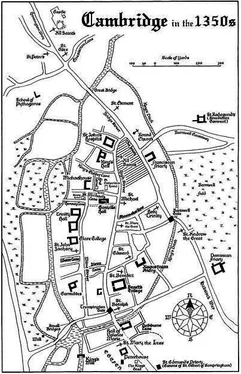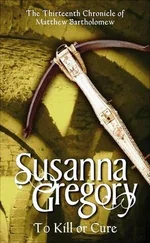‘No,’ said Philippa firmly. She pointed to two sheep bones that had been tied to Turke’s expensive shoes with pieces of leather. Now they lay on the floor in a sodden heap with the rest of his clothes. ‘I can see he was wearing skates, and so my initial claim was obviously wrong. Please respect my wishes and leave him alone.’
‘She is right,’ agreed Abigny. ‘No amount of questioning will bring him back, and there is no point in causing distress by prolonging the incident. I shall arrange for him to be prepared for his journey to London.’
Philippa stared angrily at her brother for a moment, then took Edith’s arm and strode from the room. Abigny scurried after her, and Bartholomew could hear them arguing as they crossed the yard and climbed the stairs that led to Stanmore’s solar.
‘How strange,’ said Stanmore, watching them in puzzlement. ‘It was not many moments ago that she was so distraught with grief she could barely speak. Now she seems almost cold.’
‘Poor choice of words,’ said Michael, indicating the corpse. ‘But I know what you mean. What can you tell from the body, Matt?’
‘Philippa asked me not to examine it. She made her feelings quite clear about that.’
‘That was before he died. You have just spent an hour poking and prodding at him, so how can she object to a little more now?’
‘Go and ask her,’ suggested Bartholomew. He nodded wryly when Michael hesitated. ‘You see? You do not really believe she will give us her permission.’
‘Michael is right to suggest an examination, Matt,’ said Stanmore. ‘There is something odd about this incident. She was convinced that Walter would never skate on the river, and was obsessed by that point earlier. And yet she did not once mention it when we were trying to revive him here.’
‘That is because she saw for herself that he was wearing skates,’ said Bartholomew.
‘But was he actually skating?’ asked Michael, leaning down to inspect them. ‘I doubt he was. If you look here, you can see that one of the leather thongs crosses the blade. Not only would such an arrangement reduce friction and slow the skater, but it would quickly wear through and break.’
Bartholomew stared at the monk in astonishment. ‘What makes you such an expert on icy pastimes all of a sudden? I did not know you could skate.’
‘Of course I can skate,’ said Michael testily. ‘How could I not, growing up in East Anglia, where the land is flat, the water plentiful, and the winters long and cold? And I can tell you that Turke did not travel far on these particular skates.’
‘He travelled far enough to break the ice,’ said Bartholomew soberly.
‘Unfortunately, I cannot tell much about these,’ Michael went on, taking one skate and examining it minutely. ‘They are cheap, sold by every butcher in the Market Square in winter. In fact, they are so common that Turke may even have found them abandoned by a previous skater.’
‘They break,’ added Stanmore, to explain the extravagance of disposing of something that could be reused. He, too, was a Fenman and knew about skating in cold winters. ‘They eventually crack when weight is put on them, especially by an adult. You often see them discarded.’
‘Inspect Turke, Matt,’ instructed Michael impatiently. ‘I will lift the covers, if it salves your conscience, so all you have to do is look. But I want to know the exact cause of his death. Oswald is right: there is something odd about this incident.’
As it transpired, there was nothing to see. There was no wound or mark on the body, with the exception of some scratches that had probably been inflicted as Turke was rescued. There was no abrasion or bump on the head, no bleeding and no signs that he had been strangled or suffocated. A hard push on Turke’s chest revealed water in his lungs, although not enough to drown him. As far as Bartholomew was concerned, Turke’s death was exactly as it appeared: he had fallen in the river, and had frozen.
‘Does anyone know what Turke meant by “Templar”?’ asked Michael. ‘No Knights Templar exist these days, so I cannot imagine what he was talking about.’
‘I did not hear him say “Templar”,’ said Stanmore, surprised. ‘I heard him say “temper” and “you”. His meaning was quite clear: he was telling Philippa to mind her temper, as a husband’s final piece of advice to his wife.’
‘That would be an odd thing to say to her,’ said Michael warily. ‘She has never struck me as a woman given to sudden rages.’
‘I did not hear “Templar” or “temper”,’ said Bartholomew. ‘I heard “you” though, and I thought the other word was “Dympna”.’
‘It was not,’ said Michael with determination. ‘That would mean there is a link between Turke and Norbert, and that is not possible.’
‘Why not?’ asked Bartholomew. ‘Norbert was murdered after Turke arrived in Cambridge.’
Michael rubbed a hand over his eyes. ‘A connection between a wealthy fishmonger and a debauched and worthless idler? I do not think so!’
‘Do not be too hasty to dismiss it,’ warned Bartholomew. ‘Consider two things. First, Turke was a merchant and Norbert was a merchant’s nephew – both well-connected men with access to wealth and power, even if Norbert did have to go through his uncle for his. And second, Turke was a fishmonger. There was a fish on the ground the night Norbert was murdered.’
‘A fish?’ asked Stanmore, bewildered. ‘What kind?’
‘A tench,’ said Bartholomew. ‘Although I do not think the type is relevant.’
‘Nothing about it is relevant,’ said Michael. ‘You used the fish to connect Norbert to Harysone. Now you are using the same clue to connect Norbert to Turke.’
‘You said yourself there is something strange about Turke’s death, and I think it odd that Turke and his servant should die in such rapid succession,’ argued Bartholomew. ‘Perhaps the three deaths are related. There is nothing to say they are not.’
‘But you said Norbert won the tench from Harysone by dicing, and dropped it as he fled for his life,’ said Michael. ‘How can that possibly have anything to do with Turke? And you told me earlier there was nothing odd about Gosslinge’s death. Have you changed your mind?’
‘I think there is something odd about the timing of Gosslinge’s and Turke’s deaths, not the deaths themselves – they both appear to be accidental and caused by the cold. And I think Turke muttering “Dympna”, the fact that he and Gosslinge were in the fishmongering trade, and that Norbert won a fish indicates all three deaths may be related. Perhaps Harysone is the factor that connects them.’
‘I would like you to be right,’ said Michael. ‘You know how dearly I would like to catch that man doing something wrong. But even I cannot see how he can have anything to do with Turke and his servant, just because Norbert happened to win a tench before he died.’
‘You are wrong about Turke’s last words, too,’ added Stanmore. ‘He did not say “Dympna”.’
‘Temper, Templar, Dympna,’ mused Michael thoughtfully. ‘We all heard different things, and there is no way to prove which of us is right. However, there is one other thing we should consider.’
‘I know,’ said Bartholomew, anticipating what the monk was going to say. ‘We might not know what Turke meant, but Philippa certainly did. Her behaviour changed from grief-stricken to coolly contained almost the instant he spoke to her.’
When Bartholomew and Michael arrived back at Michaelhouse, an afternoon meal was ready, and the students were in a state of excitement; they were going to elect their Lord of Misrule, who would run the College for the Twelve Days. This was an ancient tradition and, although some of the Fellows were keen to have it abolished, the students were equally determined to see it continue. The Lord of Misrule had absolute power over all College members, and everyone was obliged to do what he ordered. Usually, this was confined to ordering the Fellows to serve the students at the dinner table, or obliging them to listen to lectures written and delivered by students for their edification. Sometimes the pranks could be amusing, but sometimes they were a nuisance, and other times they were a genuine menace.
Читать дальше












